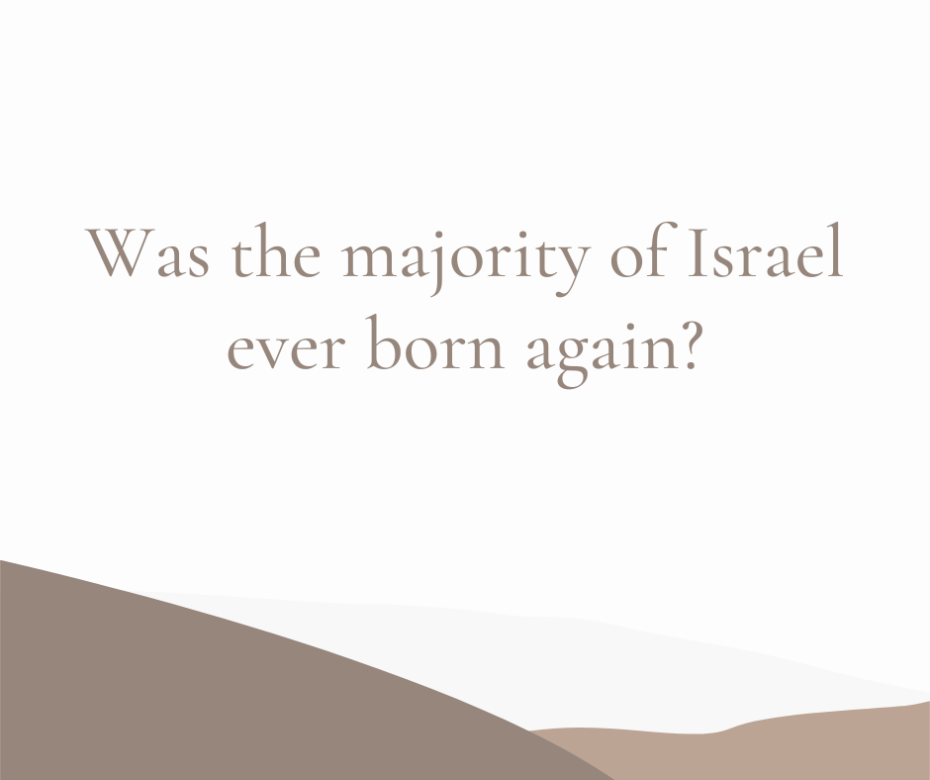GES has a cadre of more than a dozen writers working on a commentary for the OT (the Tanakh). Last night, we had a Zoom meeting of all the authors plus the six editors.
At one point, the question of the readership of the OT came up. Except for John’s Gospel, the NT is written to believers. Was the OT written to believers as well?
Some think that all the Jewish people who came out of Egypt, except possibly for the mixed multitude in their midst, were born again. They say that because the nation was passed over during the tenth plague, and Scripture tells us that Israel was redeemed from slavery in Egypt.
But redemption from slavery in Egypt is not the same as being born again. Nor is being passed over during a plague.
Consider the nation at the time of Jesus’ ministry. The Messiah was now present. He proved that He is the Messiah who guarantees everlasting life to all who believe in Him. Yet John tells us that “He came to His own, and His own did not receive Him” (John 1:11). Only a small fraction of the Jewish people came to faith in Jesus during His ministry. Only a remnant of Jews was born again, even after thousands came to faith during the ministry of the apostles in Israel (Rom 11:5, “at this present time there is a remnant”).
If only a remnant were born again during the first century, it is highly unlikely that a larger percentage was born again during the 400 silent years between Malachi and John the Baptist. It is unlikely that any period in Israel’s history had more than a remnant that was born again.i I’d even include the Exodus generation. Remember that ten of the twelve spies sent into the Promised Land counseled going back to Egypt! And the nation as a whole agreed with them.
So, if there was never a time when the entire nation was born again,ii then the OT was not written exclusively to believers. But, except possibly for Job, the entire OT was written to the covenant people, the chosen people, Israel. All of the people in Israel believed in Yahweh. However, not all Jews believed in the coming Messiah for everlasting life.
In the Zoom meeting, it was suggested that not a single OT book was written to Gentiles. It was said that even when the Edomites, Ninevites, or other Gentile nations were addressed, the message was not actually to them; instead, Israel was being told about them.
This issue is important in interpreting the OT. Take the Wisdom Literature, for example. When we read about the wise and the fools, or the righteous and the wicked, we should not be thinking of those who are born again and those who are not. Instead, we should think of Jews who were walking in fellowship with God and Jews who were not. Born-again Jews who were not walking in fellowship with God were fools and unrighteous. Jews who were walking in fellowship with God were wise and righteous in their experience (cf. Luke 1:6).
The Tanakh was written to the chosen people, Israel. They were people who had several covenants with God. However, the Tanakh was not written merely to the born-again Jews. It was written to all of the Jews.
__________
i I think it likely that Matt 7:13-14 applies backward as well. The way has always been narrow (faith in Christ for everlasting life), and few have found it. However, it is possible that most, if not all, of Adam and Eve’s children came to faith in the coming Messiah.
ii Even if, during the wilderness wanderings, the entire nation believed in the coming Messiah for everlasting life, then only the Pentateuch would have been written exclusively to believers.


